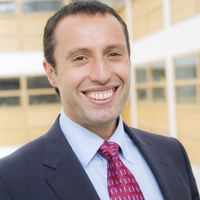
MD PhD FRCP, Hon Consultant Rheumatologist
Clinical Chair in Experimental Medicine and Rheumatology
- About
-
- Email Address
- c.debari@abdn.ac.uk
- Office Address
School of Medicine, Medical Sciences and Nutrition
University of Aberdeen
Aberdeen Centre for Arthritis and Musculoskeletal Health
Arthritis and Regenerative Medicine Laboratory
Institute of Medical Sciences
Foresterhill, Aberdeen AB25 2ZD
United Kingdom
- School/Department
- School of Medicine, Medical Sciences and Nutrition
Biography
Professor Cosimo De Bari is a clinically active rheumatologist and a translational scientist with expertise in musculoskeletal regenerative medicine and arthritis pathophysiology. He has a long-standing interest and track record in the study of joint health and disease, with a focus on cell-based therapies for cartilage repair and osteoarthritis.
Cosimo graduated in Medicine (summa cum laude) from the University of Bari (Italy), where he underwent specialist training in Rheumatology. He obtained his PhD from the University of Leuven (Belgium). In 2003 Cosimo moved to King's College London, where in 2005 he was awarded an MRC Clinician Scientist Fellowship. Since 2007 Cosimo holds a clinical chair in Experimental Medicine and Rheumatology (previously Translational Medicine) at the University of Aberdeen.
Cosimo is the founder and director of the Aberdeen Centre for Arthritis and Musculoskeletal Health (awarded “Centre of Excellence in Rheumatology” status by the EULAR), leads the Arthritis and Regenerative Medicine Laboratory, and is deputy director of the Tissue Engineering & Regenerative Therapies Centre Versus Arthritis.
External Memberships
Cosimo has accepted more than 100 invitations to speak at national and international venues, including international conferences, and universities and institutes in Europe and overseas, or to chair sessions and symposia. He takes part in conference organising/program committees such as OARSI.
Cosimo is an Associate Editor for Osteoarthritis and Cartilage and a member of the editorial boards of several journals including Regenerative Medicine. He has served on numerous grant review panels of national and international funding agencies, including MRC, Versus Arthritis, NIHR, NC3R, Vienna Science and Technology Fund, Dutch Arthritis Foundation, California Institute for Regenerative Medicine, and European Commission.
- Research
-
Research Overview
The ultimate goal of Professor De Bari's research programme is the development of novel cell-based therapeutic approaches to skeletal repair. His programme consists of two main areas.
The first is centred on the development and validation of "clinically relevant" assays and surrogate measures of the potency of stem cell preparations, to be used as quality controls for efficacy of stem cell therapies in the clinic.
The second area of investigation aims at characterizing the niches of resident stem cells within the joint environment and studying their molecular regulation in vivo in health and diseases such as osteoarthritis and rheumatoid arthritis. Understanding the roles of stem cells in the pathophysiology of joint homeostasis, remodelling and repair in health and disease will be instrumental for the development of novel therapeutic protocols to trigger and enhance intrinsic joint surface repair by targeting resident stem cells, with the ultimate goal to modify disease outcome and restore a functional joint homeostasis.
- Publications
-
Page 3 of 10 Results 21 to 30 of 91
Immunostaining of Skeletal Tissues
Methods in molecular biology (Clifton, N.J.), vol. 1914, pp. 437-450Contributions to Journals: Articles- [ONLINE] DOI: https://doi.org/10.1007/978-1-4939-8997-3_25
Targeting anti-chondrogenic factors for the stimulation of chondrogenesis: A new paradigm in cartilage repair
Journal of Orthopaedic Research, vol. 37, no. 1, pp. 12-22Contributions to Journals: Review articles- [ONLINE] DOI: https://doi.org/10.1002/jor.24136
- [ONLINE] View publication in Scopus
- [ONLINE] View publication in Mendeley
Stem Cell-based Therapeutic Strategies for Cartilage Defects and Osteoarthritis
Current Opinion in Pharmacology, vol. 40, pp. 74-80Contributions to Journals: Review articlesAdipose specific disruption of seipin causes early-onset generalised lipodystrophy and altered fuel utilisation without severe metabolic disease
Molecular Metabolism, vol. 10, pp. 55-65Contributions to Journals: ArticlesThe potential role of adult stem cells in the management of the rheumatic diseases
Therapeutic advances in musculoskeletal disease, vol. 9, no. 7, pp. 165-179Contributions to Journals: Review articles- [ONLINE] DOI: https://doi.org/10.1177/1759720X17704639
Joint morphogenetic cells in the adult mammalian synovium
Nature Communications, vol. 8, 15040Contributions to Journals: ArticlesMesenchymal stem cells for management of rheumatoid arthritis: immune modulation, repair or both?
Current Opinion in Rheumatology, vol. 29, no. 2, pp. 201-207Contributions to Journals: Review articles- [ONLINE] DOI: https://doi.org/10.1097/BOR.0000000000000370
- [OPEN ACCESS] http://aura.abdn.ac.uk/bitstream/2164/10119/1/Ansboro_et_al_revised.pdf
- [ONLINE] View publication in Scopus
Regenerative Medicine and Tissue Engineering
Kelley and Firestein's Textbook of Rheumatology. Tenth Edition edition. Elsevier, pp. 90-105.e4Chapters in Books, Reports and Conference Proceedings: Chapters- [ONLINE] DOI: https://doi.org/10.1016/B978-0-323-31696-5.00007-3
- [ONLINE] View publication in Scopus
Bone Marrow Contribution to Synovial Hyperplasia Following Joint Surface Injury
Arthritis Research & Therapy, vol. 18, 166Contributions to Journals: ArticlesMICL controls inflammation in rheumatoid arthritis
Annals of the Rheumatic Diseases, vol. 75, no. 7, pp. 1386-1391Contributions to Journals: Articles
